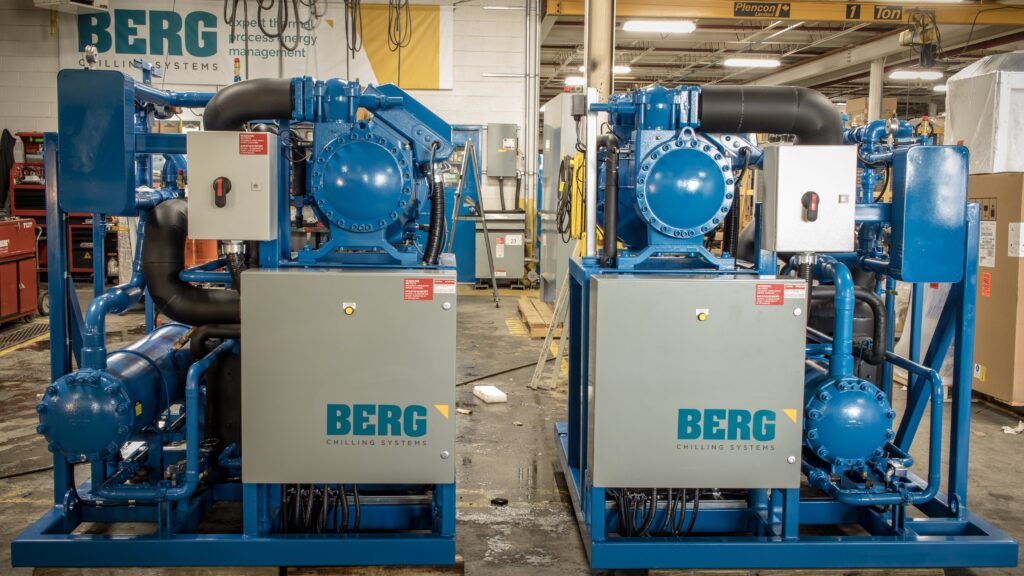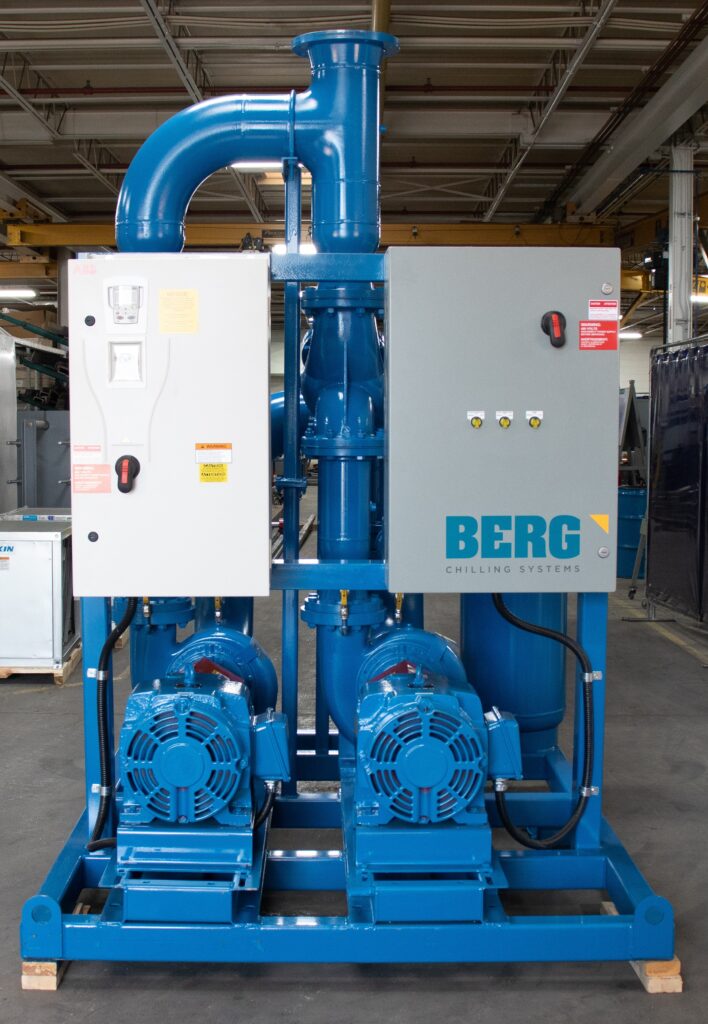Water-cooled chillers are essential for maintaining comfortable temperatures in buildings and ensuring the proper functioning of industrial processes. However, their installation and operation come with unique challenges. Berg Industrial Service is here to professionally address your installation and start-up needs, operating 24/7 with continual access to our well-stocked inventory.
Berg water-cooled chillers exemplify our commitment to providing solutions that meet today's industrial cooling demands while contributing to a more sustainable and environmentally responsible future.

One primary challenge in installing a water-cooled chiller is finding sufficient space for the system. These chillers require ample room for the chiller unit, ancillary equipment like pumps, cooling towers, and piping. In cramped urban environments or existing buildings with limited space, locating suitable installation sites can be a significant obstacle.
Strategy: Engage with experienced HVAC engineers and contractors early in the design process to assess space requirements. Identify feasible solutions, such as rooftop installations or compact chiller designs, to maximize available space.
Water-cooled chillers rely on steady supply of water for their operation, which can pose challenges in regions with limited water availability or poor water quality. Issues such as water scarcity, high mineral content, or biological contaminants can affect chiller performance and increase maintenance requirements.
Strategy: Conduct thorough water quality assessments and implement appropriate water treatment measures, such as filtration, chemical treatment, or corrosion inhibitors, to maintain optimal chiller performance and prolong equipment lifespan. Explore alterative water sources, such as recycled or reclaimed water, where feasible.
While water-cooled chillers are generally more energy-efficient than air-cooled chillers, particularly in larger applications. However, it also can be energy-intensive if they are not properly maintained or operated. Equipment selection, system design, and operating parameters can all influence energy use and greenhouse gas emissions.
Strategy: Embrace energy-efficient technologies and practices, such as variable-speed drives, heat recovery, and thermal storage, to enhance chiller efficiency and reduce energy consumption. Additionally, ensuring that the chiller is properly sized for the cooling load can help prevent energy waste. Consider the environmental implications of refrigerant selection and explore low-global warming potential (GWP) alternatives to minimize climate impact.

Like any mechanical system, water-cooled chillers require regular maintenance to ensure smooth operation and prevent costly downtime. However, accessing and servicing chiller components, such as compressors, heat exchangers, and refrigerant circuits, can be challenging, particularly in large or complex installations.
Strategy: Develop a comprehensive maintenance plan that includes routine inspections, preventive maintenance tasks, and proactive troubleshooting to identify and address potential issues before they escalate. Invest in training for maintenance personnel and leverage predictive maintenance technologies, such as condition monitoring and remote diagnostics, to optimize chiller reliability and performance.
Navigating regulatory requirements and ensuring compliance with safety standards is another critical aspect of water-cooled chiller installation and operation. From building codes and environmental regulations to occupational health and safety guidelines, there are numerous legal and regulatory considerations throughout the lifecycle of a chiller system.
Strategy: Stay informed about relevant regulations and standards, and work closely with regulatory authorities to ensure compliance. Implement robust safety protocols and training programs to protect personnel and mitigate risks associated with chiller operation, maintenance, and servicing.
Water-cooled chillers offer efficient and reliable cooling solutions for various applications, but navigating their installation and operation challenges requires careful planning, proactive management, and interdisciplinary collaboration. By taking these steps, stakeholders can overcome obstacles and maximize chiller system performance and longevity.
With over 50 years of experience, Berg offers innovative and reliable cooling solutions tailored to your needs. Our team of experts is dedicated to achieving operational excellence in your industrial processes. Whether you need an air cooled chiller, a water cooled chiller, or a combination, we leverage our expertise to deliver optimal performance and cost-effectiveness. Discover how Berg custom designed and supplied a water-cooled refrigeration system for a deep sea welding vessel's climate control system.
Ready to invest in a reliable industrial refrigeration system? Contact us today to explore our range of chillers, engineering services, and support. Let Berg help you achieve peak efficiency and performance in your industrial processes. Experience the Berg difference today.